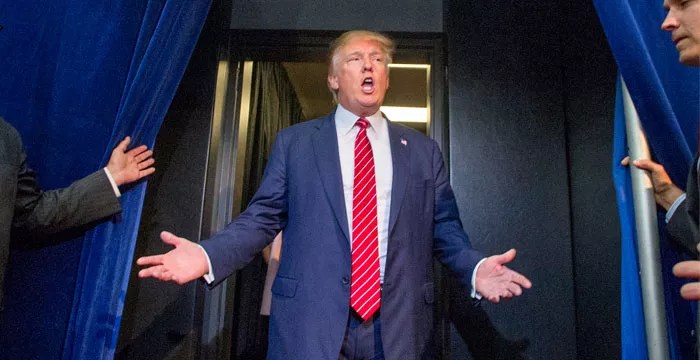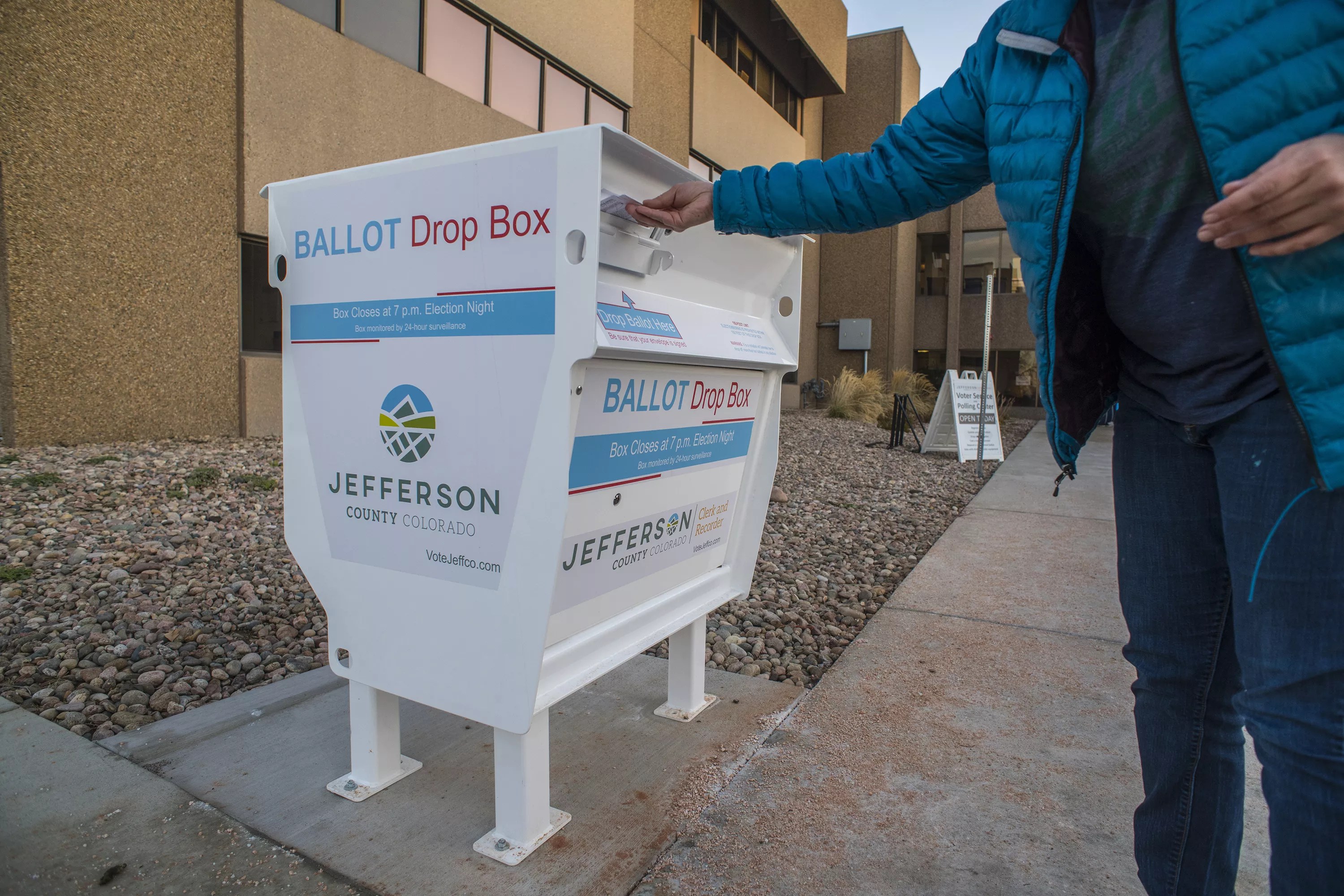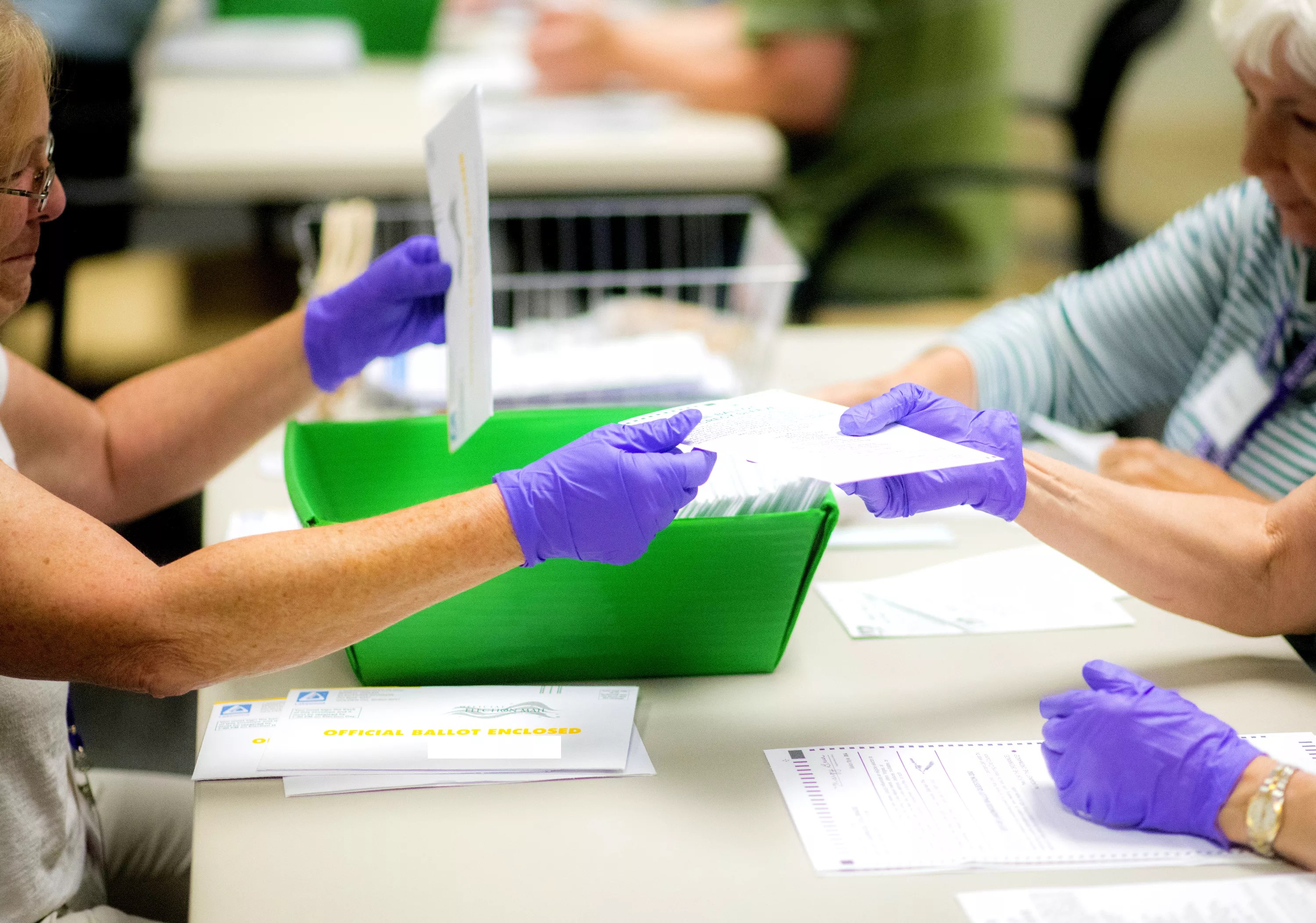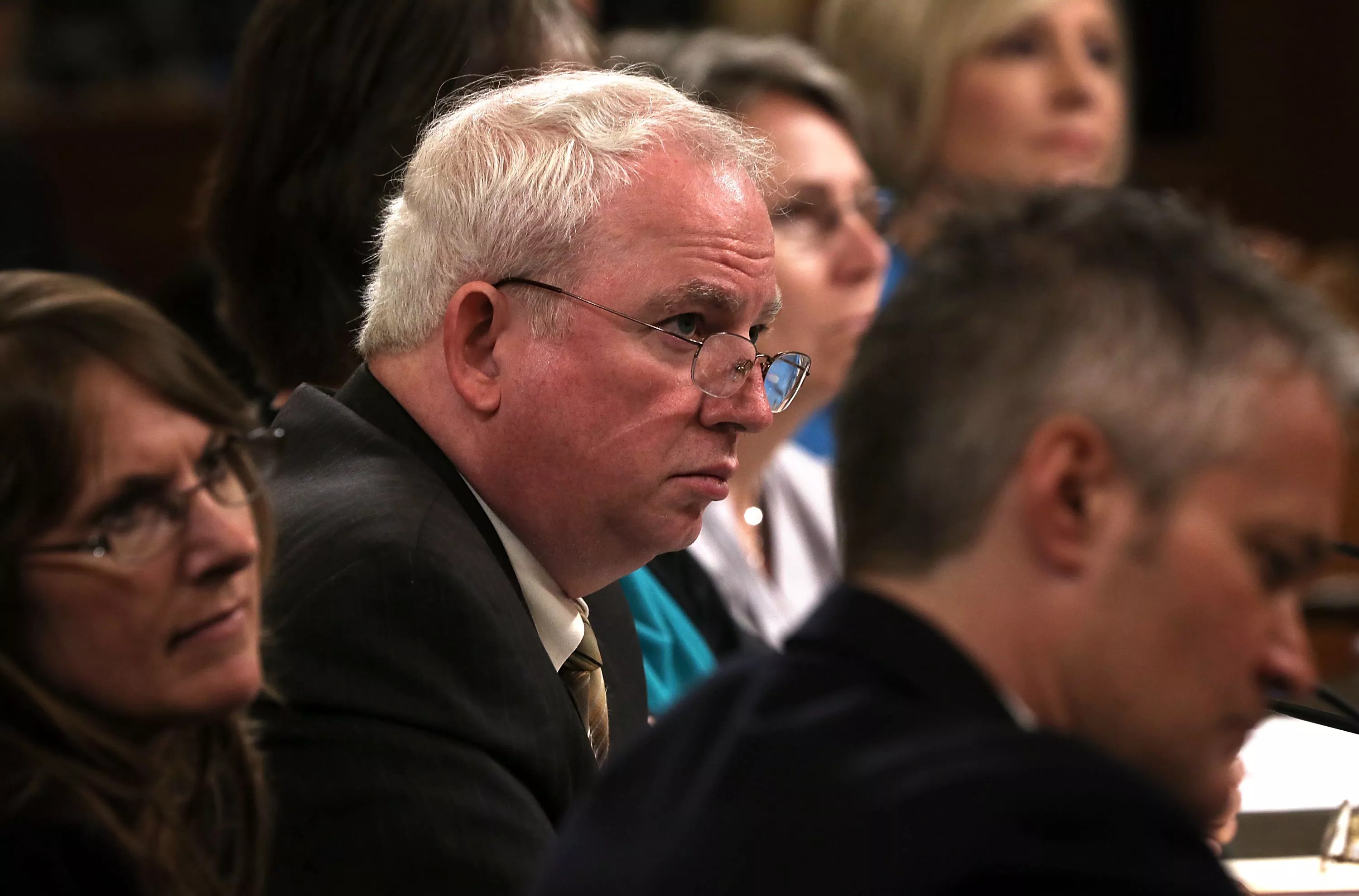
Evan Semón

Audio By Carbonatix
With November 5 fast approaching, anxiety over election integrity and the safety of those charged with administering elections is peaking.
On October 23, the Department of Justice announced that a man from Cortez, Teak Ty Brockbank, had pleaded guilty to making online threats against Colorado Secretary of State Jena Griswold and other officials.
In September 2021, Brockbank posted this about Griswold on social media: “I live in Communist Colorado and this Crazed liberal and many others in Communist Colorado needs to- No has to Hang she has to Hang by the neck till she is Dead Dead Dead.”
Griswold was in the hospital when Brockbank was arrested in August, and the secretary of state’s increased security requirements resulted in national press coverage, including a headline in Rolling Stone that read, “Colorado’s Election Chief Took on Trump. She Needed Extra Security As She Gave Birth.”
It was a harsh reminder that, while not a swing state, Colorado did become the focus of a rogues’ gallery of election deniers after the November 2020 election. From the infamous “coup memo” authored by a visiting professor at the University of Colorado Boulder to improper interference by a Colorado county clerk to a slew of defamation lawsuits filed after Denver-based Dominion Voting Systems was vilified by Stop the Steal conspirators, the Big Lie hit home…hard.
“Dominion is running our Election. Rigged!” Donald Trump tweeted less than two weeks after he lost the 2020 presidential race.
Four years earlier, he’d called the entire Colorado election system “rigged” after he failed to come out on top of the state’s Republican primary convention.
Election experts around the country consider Colorado’s system the “gold standard.” But this state has gotten a little tarnished with Colorado’s unwanted time in the spotlight since November 3, 2020.

From ballot box to election office, Colorado’s system is monitored.
Evan Semón
“Ballot Fraud Scheme Under Investigation in Mesa County,” Secretary of State Griswold’s office announced on October 24.
At least twelve Mesa County ballots were intercepted before reaching their intended destinations, fraudulently filled out by whoever stole them, and returned to the Mesa County Clerk and Recorder to be counted. The voter fraud was caught during the state’s signature verification process.
That’s exactly what’s supposed to happen, says Martha Tierney, attorney for the Colorado Democratic Party. “The system for the most part worked, and the signature verification process caught most of those ballots so that they did not get counted. I’m confident that they’re going to find that person and hopefully charge them with that, because that’s the way to deter bad actors from engaging in that behavior. I mean, look at Tina Peters: She got nine years in prison.”
Indeed, former Mesa County clerk Tina Peters’s example should loom large as a deterrent for partisan election officials tempted to interfere with the voting system.
After the 2020 election, Peters became fixated on imagined problems with Dominion voting machines in Mesa County, where she oversaw elections. Convinced that Donald Trump actually won the vote, Peters ordered surveillance cameras monitoring election equipment turned off, then allowed a conspiracy theorist to access voting machines and copy their information.
Griswold’s office began investigating, eventually decertifying the county’s voting equipment, while Peters became a star in MAGA world, flown around and given safe harbor by infamous pillow dealer Mike Lindell. At a Lindell-sponsored election conspiracy conference, the stolen Mesa County data was released. Mesa County’s Republican district attorney filed charges against the clerk.
In March 2022, Peters was indicted on felony criminal counts, including attempting to influence a public servant, and misdemeanors that ranged from official misconduct to violation of duty. In August, a jury found her guilty of four felonies and three misdemeanors.
After Peters offered a lengthy excuse for her actions at sentencing in early October, the presiding judge had some particularly harsh words for her: “You are no hero. You’re a charlatan who used, and is still using, your prior position in office to peddle a snake oil that’s been proven to be junk time and time again. … I’m convinced you would do it all over again if you could. You’re as defiant a defendant as this court has ever seen.”
Peters received a nine-year prison sentence.
“Hopefully that is sending a message to people who would engage in misinformation about our elections and try to break the law when it comes to election processes and security,” Tierney says.
But Peters’s Stop the Steal zeal and subsequent prosecution were referenced by Brockbank when he pleaded guilty to threatening Secretary of State Griswold and other officials.

Colordo election workers handle ballots.
Evan Semón
Brockbank was also pissed off at the majority of the Colorado Supreme Court judges, who ruled in late 2023 that Donald Trump was disqualified from holding the office of president under Section 3 of the Fourteenth Amendment, the so-called Insurrection Clause.
“Four judges in Colorado have removed President Trump from the ballot in Colorado. their names have been added to my list… their names have been moved to the front of my list,” Brockbank wrote in a private message, according to the FBI.
Six Coloradans – including both unaffiliated voters and concerned Republicans, among them 91-year-old former state lawmaker Norma Anderson – had brought a lawsuit in September 2023 alleging Trump’s ineligibility to appear on Colorado’s presidential primary ballot under the Insurrection Clause. While she didn’t agree that the clause applied to the President of the United States, the judge agreed that Trump had engaged in an insurrection. “The Court concludes…that Trump incited an insurrection on January 6, 2021, and therefore ‘engaged’ in insurrection. … The Court concludes that Trump acted with the specific intent to disrupt the Electoral College certification of President Biden’s electoral victory through unlawful means; specifically, by using unlawful force and violence.”
Both the plaintiffs and Trump’s attorneys appealed; in December, the Colorado Supreme Court ruled 4-3 that the clause did apply to Trump, agreed that he had incited an insurrection, and determined that he was ineligible for the presidency.
The U.S. Supreme Court judges subsequently and unanimously agreed that neither Colorado nor any other state – only Congress – could enforce Section 3 of the Fourteenth Amendment. The court did not weigh in on Trump’s actions connected to January 6.
At his campaign appearance in Aurora on October 11, Trump falsely accused Governor Jared Polis, a Democrat, of attempting to remove him from the 2024 ballot.
The former president wasn’t very happy with the rest of Colorado, either.

Donald Trump has called Colorado’s election system “rigged.”
Evan Semón
Voting machines – a bogeyman for the Stop the Steal movement – have loomed large in Colorado’s election denier saga.
Dominion Voting Systems was falsely and extensively accused of flipping votes from Donald Trump to Joe Biden in the 2020 election, a conspiracy theory that had its roots in the QAnon movement.
Founded as a Canadian company in 2003, Dominion Voting Systems was incorporated in the United States in 2009, when it set up offices in Denver, ultimately landing in the building at 1801 Lawrence Street that had housed the Old Spaghetti Factory. In 2020, it was one of the largest voting-equipment companies in the country, providing machines and software to more than 1,300 jurisdictions – including 62 of Colorado’s 64 counties. Its machines also tabulate votes in 26 other states and Puerto Rico.
After the November 2020 election, as Dominion became the focus of election deniers’ claims, employees had to move out of that office because of threats. Rumors spread that Dominion was connected to Nancy Pelosi and the Clinton Foundation, or funded by Venezuelan communists.
Despite assurances by the U.S. Cybersecurity and Infrastructure Security Agency (CISA) that “there is no evidence that any voting system deleted or lost votes, changed votes or was in any way compromised,” Dominion became a prime target, smeared across conservative media.
The company kept attempting to set the record straight on its web page, but ultimately Dominion sued a slew of media outlets and individuals ranging from Lindell to Rudy Giuliani.
In the spring of 2023, after a number of embarrassing revelations, Fox News settled one Dominion lawsuit for $787.5 million. Another Trump-friendly outlet, Newsmax, issued an on-air apology in 2021 to Dominion for repeating lies about the machines.
But despite those costly consequences, anti-Dominion rhetoric is heating up again this election cycle.
In mid-October, after a Georgia voter mistakenly touched the wrong candidate’s name, then fixed the mistake, Republican Representative Marjorie Taylor Greene launched a fresh conspiracy theory about Dominion. She posted on social media: “We vote on Dominion voting machines then it prints a paper ballot with our selections made on the machines. This voter’s printed ballot had been changed from their selections made on the machine.” Greene repeated the false claim on conspiracy theorist Alex Jones’s radio program.
Dominion was quick to hit back with a rebuttal in which its Georgia voting system implementation manager declared, “I can guarantee that this is the most secure election in the state of Georgia.”
Newly minted Trump supporter Elon Musk also put the Colorado-based voting machine company on blast while at a Trump campaign event at a high school outside Philadelphia.

Elon Musk spread rumors about Dominion at a Pennsylvania stop for Trump.
Samuel Corum/Getty Images
“When you have mail-in ballots and no proof of citizenship, it’s almost impossible to prove cheating,” Musk said. “Statistically, there are some very strange things that happen that are statistically incredibly unlikely. There’s always this question of, say, the Dominion voting machines. It is weird that, I think, they were used in Philadelphia and in Maricopa County [Arizona] but not in a lot of other places. Doesn’t that seem like a heck of a coincidence? The last thing I would do is trust a computer program.”
Musk’s call-out of Dominion didn’t go unnoticed by Joe Oltmann, a Colorado businessman who hosts Conservative Daily Podcast and noted Musk’s comments on a recent episode – even though Oltmann himself has been battling a defamation lawsuit filed by a former Dominion employee.
Oltmann became central to the Stop the Steal movement shortly after the 2020 election, when he claimed to have infiltrated an “Antifa” conference call and heard a Dominion employee say not to worry about the election, “because Trump is not going to win. I made effing sure of that.”
Other Dominion employees were stalked and threatened as well. “Dominion employees are being forced to retreat from their lives due to personal safety concerns, not only for our employees themselves, but also for their extended families,” the company said in a November 2020 statement. In January 2021, Dominion said it had spent more than $565,000 on protection for its staff since the election two months earlier.
Oltmann specifically targeted Eric Coomer, then director of product strategy and security for Dominion, as Antifa’s inside man, with no substantiation. Trump lawyers Sidney Powell and Giuliani picked up Oltmann’s false narrative and ran with it.
Coomer filed defamation lawsuits against all three, as well as some Trump-friendly news outlets and the Trump campaign. Until early October, Oltmann had been ordered to pay a $1,000-per-day fine until he complied with a Denver District Court judge’s order to produce documents backing his Antifa phone call assertions; the case has now been moved to the Tenth Circuit Court of Appeals.

John Eastman in front of a Congressional committee…but not to talk about the election.
Alex Wong/Getty Images
Oltmann also intersected with Colorado’s most prominent 2020 election denier, John Eastman. In November 2020, Eastman was a Visiting Scholar at the University of Colorado’s Benson Center for Western Conservative Thought; he’d come for the temporary position from the Claremont Institute, a conservative think tank, had served as dean of Chapman University’s law school in California, and had run unsuccessfully to be that state’s attorney general in 2010.
It was Eastman who authored the infamous “coup memo” outlining a legal strategy whereby Vice President Mike Pence could refuse to certify the election on January 6, 2021.
While Oltmann was pushing his Antifa phone call claims in late 2020 and early 2021, he sent a flow chart showing his election-rigging theory to Eastman. In a deposition, Oltmann said that he met with Eastman on January 5, 2021, before Oltmann appeared as a headlined speaker at the Stop the Steal pre-rally in Washington, D.C.
On January 6, 2021, the day the insurrection raged at the U.S. Capitol, Oltmann was at the Willard Hotel with Eastman and other Stop the Steal luminaries.
CU ousted Eastman after the insurrection, and he threatened a lawsuit against the university that never materialized. Eastman was disbarred from practicing law in California and temporarily in Washington, D.C., because of his efforts to overturn the 2020 election; he’s appealed California’s action.
Eastman was presenting the Colorado Republican Party in one case challenging the state’s election law, but under the rules of Colorado’s U.S. District Court, an attorney cannot be in “good standing” to practice if they are not in good standing everywhere else they are admitted to practice. This spring, he withdrew from the Colorado case before he could be removed.
Eastman wasn’t the only Colorado attorney who faced consequences for his Stop the Steal zealotry.
Trump attorney Jenna Ellis, a former deputy district attorney in Weld County, pleaded guilty to a felony count of aiding and abetting false statements in a Georgia court last year for lying about the 2020 election results. Ellis had also repeated incorrect claims that Dominion voting machines were rigged against Trump.
In May, a state judge ordered Ellis’s Colorado law license suspended for three years. “If I knew then what I know now, I would have declined to represent Donald Trump in these post-election challenges,” Ellis said in a statement. “I look back on this experience with deep remorse.”
Ellis continues to host a conservative podcast, Jenna Ellis in the Morning, where she delivers commentary from a “biblical and constitutional perspective.”

Amber McReynolds believes in the integrity of the election system.
Evan Semon
“I’ll never forget the first death threat I had,” says Amber McReynolds, head of Denver elections as the city’s clerk and recorder from 2005 to 2018. “It was actually prior to the 2016 election. I simply corrected then-candidate Trump about a lie that he said in a speech he was giving out in Jefferson County. I corrected it on Twitter, and then the next morning went into the office and had emails with my picture on a gun range sent into the office.”
Even way back in the GOP primary days of 2016, Trump was alleging Colorado’s GOP delegate system was “rigged” and a “crooked deal.”
“Biggest story in politics is now happening in the great State of Colorado where over one million people have been precluded from voting!” Trump tweeted then. At a 2016 rally in Golden, Trump questioned the integrity of Colorado’s all-mail-in election. McReynolds had implemented all-mail voting for the City of Denver years prior.
McReynolds, who is not party affiliated, now serves on the National Council on Election Integrity and the National Task Force on Election Crises; she’s also a member of the Board of Governors of the United States Postal Service.
Despite all the accusations aimed at Colorado and other states, McReynolds says voters should have confidence in the election process.
“Generally, the public doesn’t understand fully or hasn’t seen the process behind the scenes or gotten a tour of an election office,” she notes. “They’ve never gone to a training about what election judges do. They’ve never gone for a tour of the counting facility. And I think it demonstrates their lack of understanding when they spread the lies they spread, and then it has deeply dramatic and violent consequences for those that run the process, and that’s what we continue to see.”
McReynolds points to digital online misinformation as a plague on this election cycle, along with threats to election officials and attempts at vote tampering. “The people that spread the worst misinformation are those that have the biggest reach and influence, whether that’s the guy who runs X and his reach, hosting and spreading notably false information, or the former president, who’s also done that,” she says.
As November 5 approaches, the presidential election and its aftermath promise a near future filled with more false claims, threats and litigation.
Election officials are “doing the tasks you do to prepare for an election, and they’re also walking through scenarios, whether it be cybersecurity, interference with other processes, bomb threats, physical security threats, or building contingencies, as we always do,” McReynolds says.
The Justice Department’s Election Threats Task Force, which brought the case against Brockbank for threatening Secretary of State Griswold, didn’t exist prior to 2021. The task force is charged with addressing threats of violence against election workers.
“I don’t care who you vote for, all the election officials I’ve worked with and I’ve known for years in Colorado, they don’t care who someone votes for,” McReynolds says. “They just want to make sure that every voter has a good experience, that every voter can access the process, that every voter has a secure and reliable process. … They so deeply care about the fact that our country was founded on this ideal of a representative democracy that is available and accessible to everyone. The campaign is partisan, but the election administration aspect is not.”